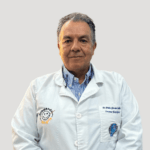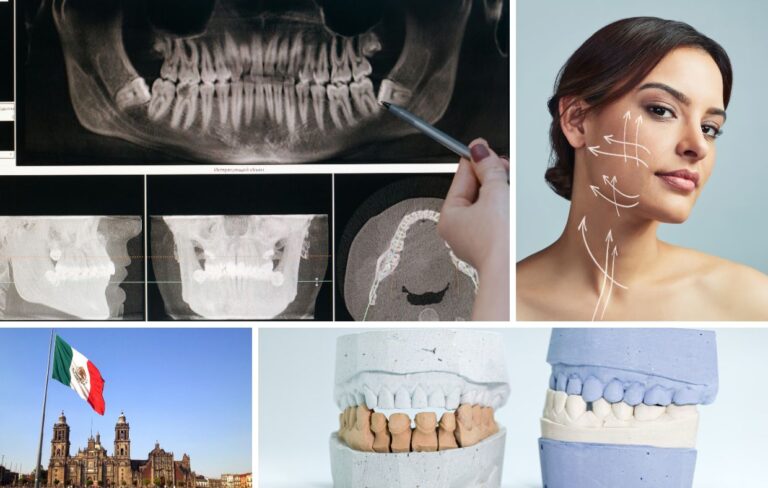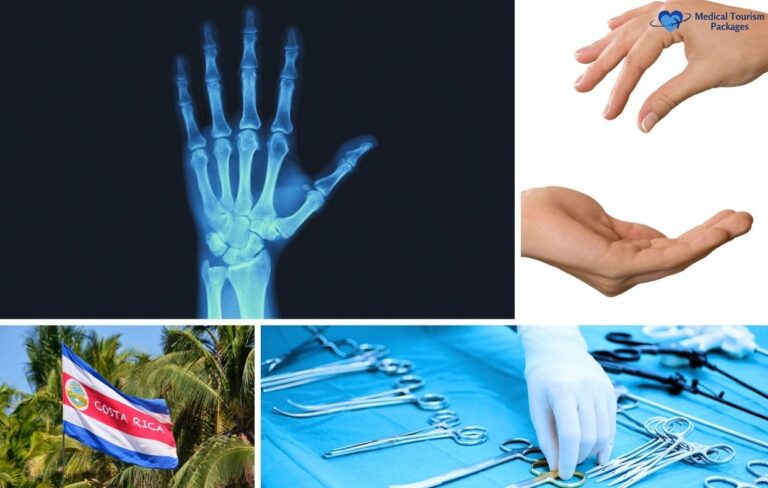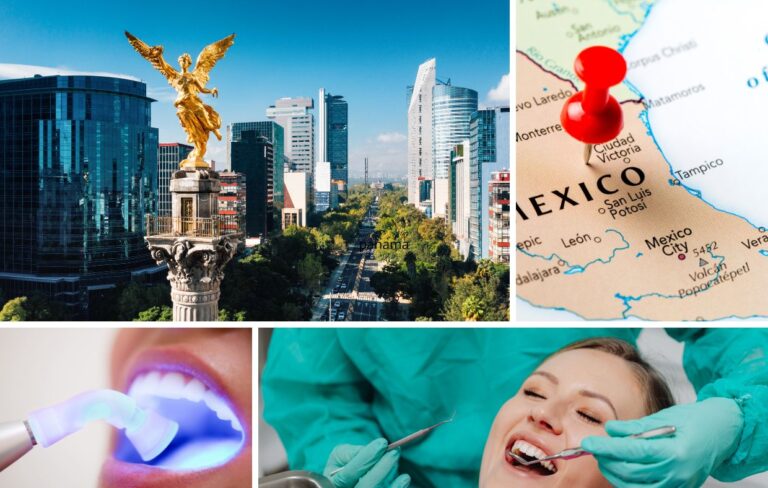Book Appointment Now
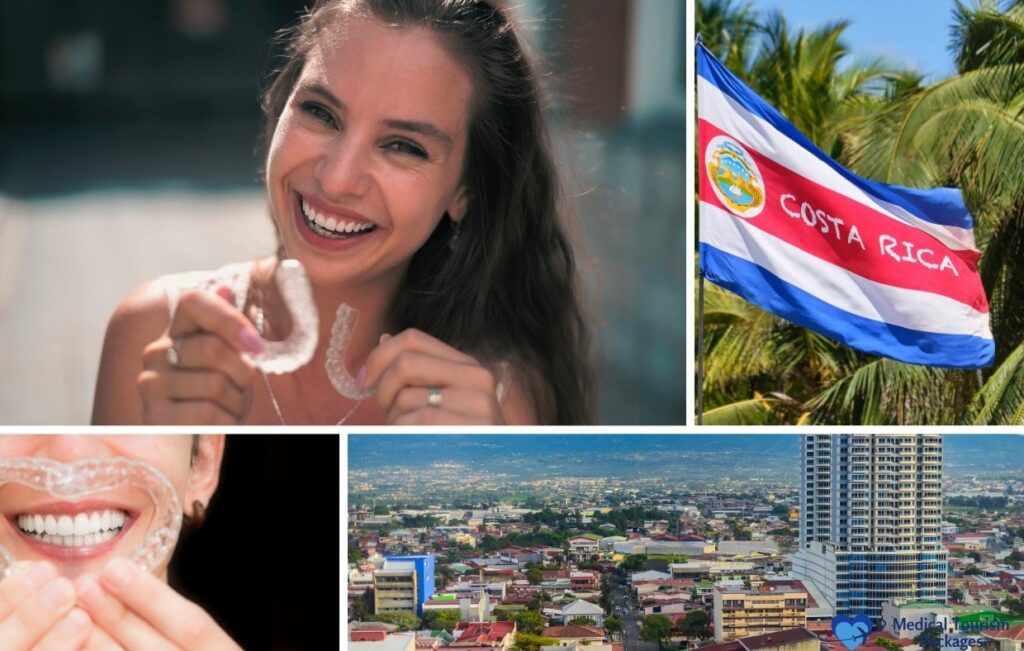
Smile Correction in Costa Rica: A Comprehensive Guide
Smile correction in Costa Rica offers 50-70% cost savings compared to US prices while maintaining American Dental Association standards through US-trained specialists and FDA-approved materials. The country’s 15+ internationally accredited dental clinics in San José perform over 95,000 dental procedures annually for international patients, generating $485 million in medical tourism revenue.
Understanding Smile Correction: Procedures and Clinical Definitions
Smile correction encompasses eight primary dental procedures that restore aesthetics and oral function through distinct clinical protocols and material applications. The systematic modification of dental structures achieves optimal outcomes by targeting teeth alignment through orthodontic treatment, color correction via whitening or veneers, shape modification using crowns, structural restoration with implants, and gum contouring through periodontal procedures.
Dental Implants: Foundation of Modern Restoration
A dental implant is a titanium or zirconia post surgically placed into the jawbone to replace missing tooth roots, integrating with bone tissue through osseointegration over 3-6 months. Costa Rican clinics charge $1,300-$1,800 for single titanium implants compared to $4,500-$5,000 in the United States, achieving 95-98% success rates that match international standards. Zirconia implants cost $2,400 and eliminate metal visibility through gum tissue while providing superior aesthetics for patients with metal sensitivities.
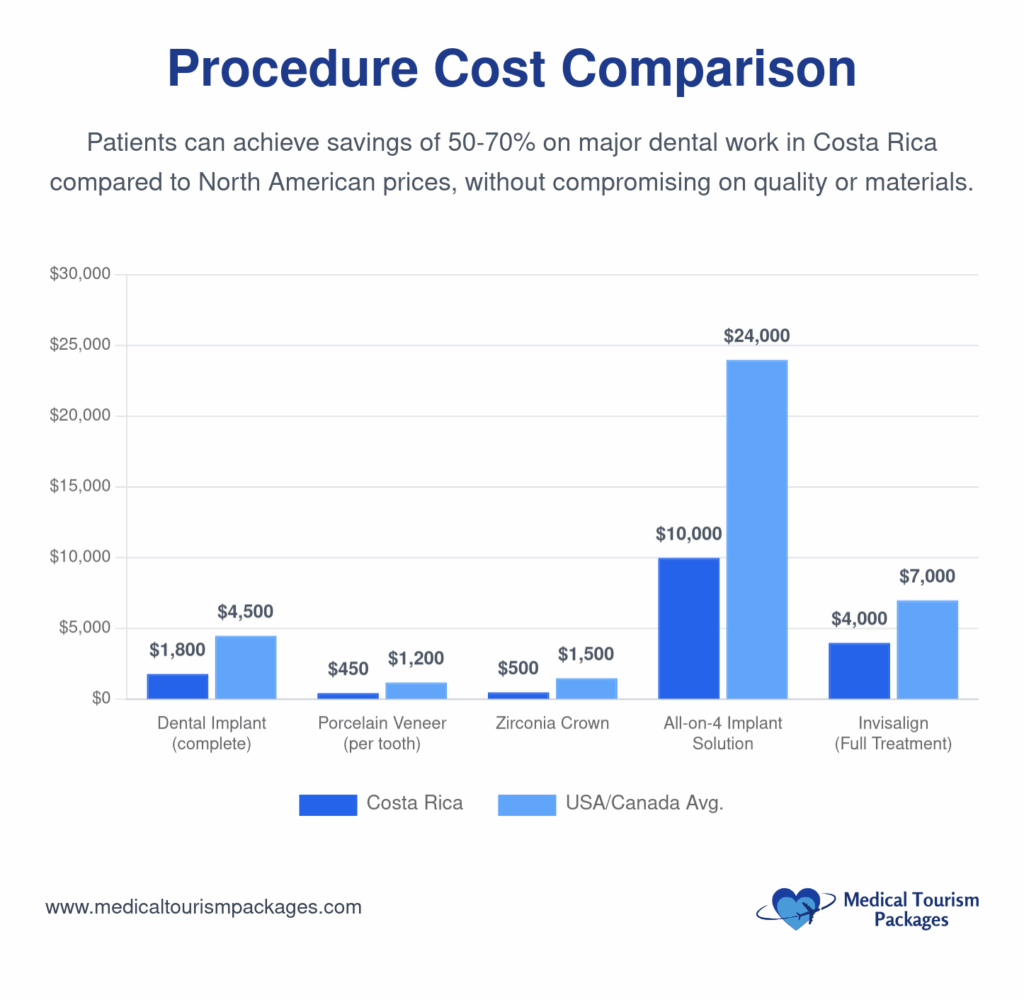
The All-on-4 treatment concept, pioneered by Nobel Biocare, restores complete dental arches using four strategically placed implants supporting fixed prostheses at $8,500-$13,000 per arch versus $24,000-$30,000 domestically. This technique angles posterior implants at 45 degrees to maximize bone utilization and avoid anatomical structures like the maxillary sinus and inferior alveolar nerve. Patients receive immediate temporary prostheses during the same surgical appointment, with final zirconia or acrylic bridges attaching after 4-6 months of osseointegration.
Premium implant systems dominate Costa Rica’s market, with Nobel Biocare featuring TiUnite surface treatment for enhanced integration, Straumann offering SLActive technology that accelerates healing to 3-4 weeks, and Zimmer Biomet providing Trabecular Metal technology that mimics natural bone structure. Immediate-load protocols require achieving 35 Ncm insertion torque minimum for same-day crown placement, though this approach carries slightly higher risk with 93-96% five-year success rates compared to 95-98% for traditional two-stage placement.
Primary Procedure Cost Comparison
| Procedure | Costa Rica | USA | Mexico | Colombia | Savings vs USA |
|---|---|---|---|---|---|
| Single Implant (complete) | $1,300-$1,800 | $4,500-$5,000 | $1,500-$1,900 | $1,500 | 60-70% |
| All-on-4 (per arch) | $8,500-$13,000 | $24,000-$30,000 | $8,000-$11,000 | $4,500-$6,000 | 63-70% |
| Porcelain Veneers (per tooth) | $400-$550 | $1,500-$2,500 | $500 | $300-$800 | 73-78% |
| Zirconia Crown | $450-$550 | $1,500-$2,500 | $600 | $500 | 70-78% |
| Full Mouth Reconstruction | $10,900-$30,000 | $30,000-$80,000 | $15,000-$35,000 | $12,000-$25,000 | 62-73% |
Veneers and Crowns: Aesthetic and Structural Solutions
Porcelain veneers are 0.5mm ceramic shells bonded to tooth fronts using resin cement, costing $400-$550 per tooth in Costa Rica versus $1,500-$2,500 domestically. Emax lithium disilicate veneers achieve 400 MPa flexural strength while mimicking natural tooth translucency, providing 10-15 year longevity with proper maintenance. Lumineers require minimal enamel reduction at 0.2mm thickness, preserving tooth structure for patients seeking reversible cosmetic improvements. The entire veneer process spans 6-11 days from consultation through tooth preparation, laboratory fabrication, and final bonding.
Dental crowns restore damaged teeth through prosthetic caps that cover and protect compromised structures. Zirconia crowns at $450-$550 demonstrate 1200 MPa flexural strength exceeding natural enamel durability, while porcelain-fused-to-metal alternatives at $399-$550 combine metal substructure strength with ceramic aesthetics. CEREC technology enables single-visit crown fabrication through CAD/CAM milling, eliminating laboratory wait times and temporary crown requirements. This same-day capability proves particularly valuable for dental tourists minimizing time away from home.
Laboratory partnerships with Glidewell Dental and Oral Arts Dental Laboratories ensure FDA-approved materials matching US standards. These facilities operate in Costa Rica using identical protocols to their American counterparts, providing crowns and bridges indistinguishable from domestic production. The combination of advanced materials, sophisticated fabrication technology, and skilled technicians delivers restorations lasting 15-25 years with adequate oral hygiene maintenance.
Comprehensive Reconstruction Procedures
Full mouth reconstruction combines multiple procedures to rehabilitate entire dentitions, with packages ranging $10,900-$30,000 compared to $30,000-$80,000 domestically. Treatment requires two trips separated by 4-6 months for osseointegration, with the initial phase involving extractions, implant placement, and temporary prostheses over 7-12 days. The second phase completes final restorations requiring 12-14 business days for laboratory work and adjustments.
Multi-specialist teams coordinate prosthodontic, surgical, and periodontal care under single roofs at clinics like Goodness Dental and Advance Dental. This integrated approach streamlines communication, improves treatment planning, and provides single-point accountability particularly valuable for international patients managing logistics from afar. The presence of in-house oral surgeons, prosthodontists, periodontists, and endodontists eliminates referral delays and ensures consistent treatment philosophy throughout complex cases.
Ancillary procedures often required for comprehensive reconstruction:
- Bone grafting: $250-$750 (vs. $1,500-$2,500 in USA)
- Sinus lifts: $1,500 (vs. $4,000 in USA)
- Tooth extractions: $75-$200 per tooth
- Periodontal therapy: $100-$233 per quadrant
- Temporary prosthetics: $500-$1,500 per arch
Why Costa Rica Dominates Regional Dental Tourism
Costa Rica’s strategic positioning within the global dental tourism landscape reflects calculated balance between quality, cost, and convenience tailored specifically to North American markets. The country commands slightly higher prices than Mexico’s border towns or Colombia’s urban centers while offering superior infrastructure, perceived safety, and quality standards that justify the premium for risk-averse patients.
Economic Drivers and Market Positioning
The fundamental economic driver remains the stark price differential enabled by lower operational costs without compromising material quality. A comprehensive cost analysis reveals that single implants save patients $2,700-$4,200 per tooth, while full-arch All-on-4 treatments generate $15,500-$19,000 savings per arch. These differentials derive from Costa Rica’s lower real estate costs, reduced administrative burden, and favorable exchange rates rather than inferior materials or techniques.
When calculating true landed costs including travel expenses, the savings proposition scales proportionally with treatment complexity. A single implant’s total cost including $1,500 in travel expenses reaches $3,100, yielding 31% savings versus $4,500 domestic pricing. However, full mouth reconstruction totaling $22,500 with travel included saves 59% compared to $55,000 US costs, demonstrating that extensive treatments provide maximum financial leverage for international patients.
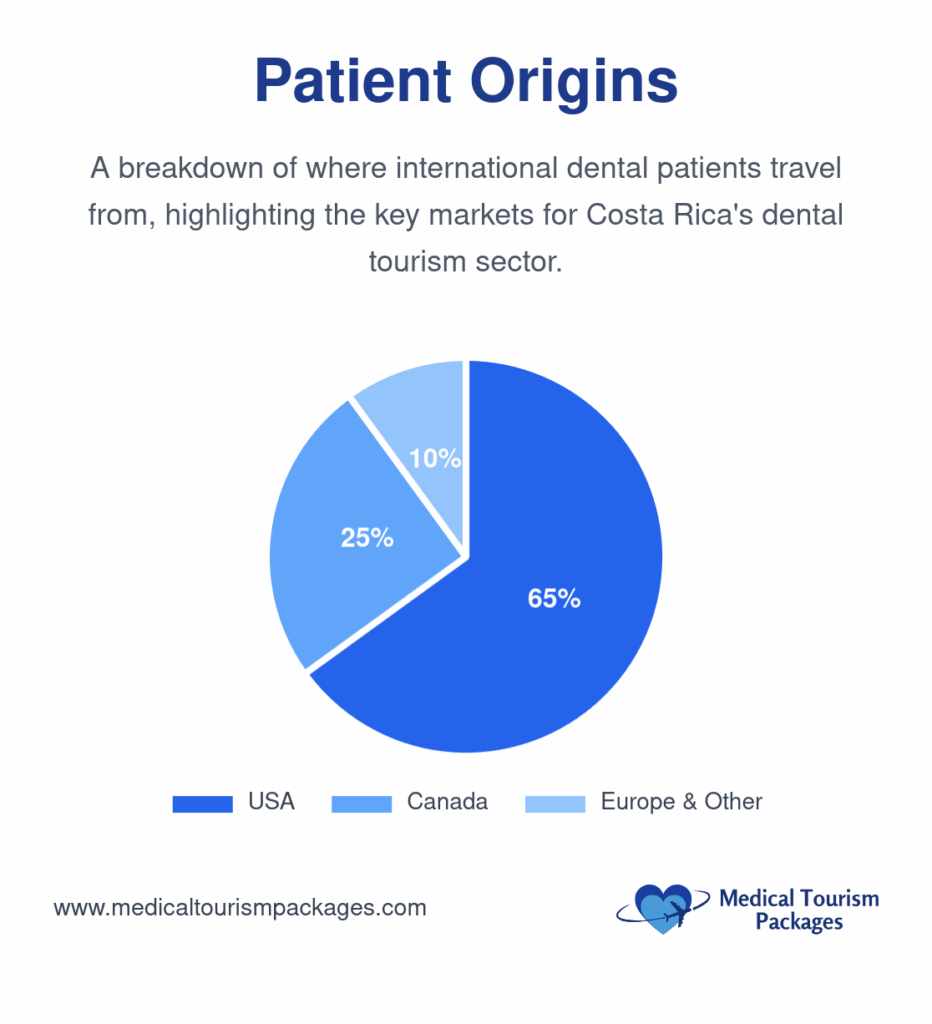
Competition from Mexico focuses primarily on proximity for border state residents, though Costa Rica counters with superior material integrity messaging. The Costa Rican Dental Association actively promotes use of FDA-approved implants from Switzerland and Germany, contrasting with allegations of Chinese materials in budget Mexican clinics. Colombia’s $4,500-$6,000 All-on-4 pricing undercuts Costa Rica significantly, but 18-hour flights from North America create logistical barriers for multi-phase treatments. Turkey’s aggressive $2,800-$4,500 pricing attracts European patients but proves impractical for Americans requiring multiple trips.
Quality Infrastructure and Regulatory Framework
The Colegio de Cirujanos Dentistas de Costa Rica (CCDCR) mandates incorporation for all practicing dentists through rigorous licensing procedures. Costa Rican universities validate degrees of foreign-trained dentists. They also authenticate documents with apostille. Dentists must pass Spanish tests and clinical exams before they can practice. This structured pathway ensures foreign dentists practicing in the country meet local standards while bringing international expertise.
Key quality indicators at leading Costa Rican clinics:
- Board-certified specialists from US universities (Loma Linda, LSU, Baylor, Tufts)
- International accreditations (GCR, JCI, ADA compliance)
- FDA-approved materials exclusively
- English-speaking staff (85% proficiency in medical districts)
- Advanced technology (CBCT, CAD/CAM, digital impressions)
- In-house laboratories with US-standard protocols
Beyond mandatory government requirements from the Ministry of Health for facility permits, voluntary oversight through industry bodies provides additional quality assurance. Global Clinic Ratings certification shows clinics meet international standards. Joint Commission International accreditation shows hospital clinics like Advance Dental at CIMA Hospital work to improve quality continuously.
Leading Practitioner Credentials
Leading practitioners exemplify the caliber attracting international patients, with Dr. Eugenio Brenes completing prosthodontic training at Loma Linda University and maintaining American College of Prosthodontists membership. Dr. Alejandro Sáenz earned maxillofacial surgery certification from Pontificia Universidad Javeriana. He took continuing education at Harvard. He is recognized as Costa Rica’s top oral surgeon. Dr. Luis Obando heads Costa Rica’s Implant Dentistry Society while Dr. Vinicio Prada serves as professor at the University of Costa Rica, demonstrating academic leadership alongside clinical excellence.
Clinical technology investments position Costa Rican facilities at international standards, with CBCT 3D imaging providing 0.1mm placement accuracy for implant planning across 15+ clinics. Digital impression systems eliminate traditional putty molds while reducing error rates below 1%, and CAD/CAM CEREC technology enables same-day crown completion at eight major facilities. Surgical guides ensure implant placement accuracy within 0.5mm, while microscope-enhanced dentistry provides 20x magnification for precision endodontic and restorative procedures.
The Patient Journey: From Planning Through Recovery
Successful dental tourism requires systematic planning addressing clinical, logistical, and financial components through structured timelines. The journey begins 60-90 days before travel with digital consultation submission, progresses through intensive treatment phases, and extends through long-term maintenance protocols ensuring lasting results.
Pre-Arrival Preparation Checklist
60-30 Days Before Travel:
- Submit digital X-rays and comprehensive medical history
- Complete virtual consultation with chosen clinic
- Receive and review itemized treatment plan
- Verify practitioner credentials independently
- Book flights and accommodation
- Secure travel insurance with medical coverage
30-7 Days Before Travel:
- Confirm appointment schedule with patient coordinator
- Obtain medical clearance if required
- Arrange work leave and delegate responsibilities
- Prepare complete medication list
- Download WhatsApp for clinic communication
- Exchange currency or notify bank of travel plans
These are the documentation requirements.
- Valid passport (no expiration during stay)
- Return flight tickets (mandatory for entry)
- Medical records with English translations
- Insurance cards and policy details
- Emergency contact information
- Prescription medications with doctor’s notes
Treatment Phase Timeline
Initial consultation processes leverage digital technology to minimize preliminary travel, with patients submitting panoramic X-rays, CBCT scans when available, and comprehensive medical histories for evaluation. Clinics typically respond within 24-48 hours with itemized treatment plans specifying exact procedures, material brands, and complete cost breakdowns including potential contingencies. This transparency enables accurate budgeting and informed decision-making before committing to international treatment.
The first day in Costa Rica involves comprehensive examination confirming treatment plans, with CBCT imaging revealing anatomical details invisible in standard X-rays. Days 2-4 typically address preparatory procedures including extractions, bone grafting, or periodontal therapy establishing foundations for definitive restorations. Primary treatments commence once preparatory work heals sufficiently, with implant placement requiring careful site preparation and precise angulation for optimal loading.
Laboratory fabrication for complex prosthetics requires 2-3 business days minimum, during which patients explore Costa Rica’s attractions or rest at accommodations. Final appointments ensure proper fit through careful occlusal adjustment, with bite registration confirming harmonious function across restored and natural teeth. Post-operative instructions detail medication schedules including antibiotics for 7-10 days, pain management protocols, and dietary restrictions protecting healing tissues.
Recovery Protocols and Accommodation
Immediate post-operative care determines long-term success, with ice application at 20-minute intervals for 48 hours controlling swelling that peaks at 72 hours. Head elevation at 30-degree angles during sleep minimizes edema accumulation, while prescribed antibiotics prevent infection during critical healing phases. All-on-4 patients maintain strict liquid diets for 72 hours followed by soft foods for three months, protecting osseointegrating implants from premature loading forces.
Accommodation selection significantly impacts recovery comfort, with clinic-affiliated options like Goodness House providing patient-exclusive environments at $79-$129 nightly including breakfast and transportation. Standard hotels near clinics range $60-$200 depending on amenities, though proximity within 2km of treatment facilities proves more valuable than luxury features. Extended stay apartments offering kitchen facilities enable soft diet preparation while providing home-like comfort during longer recoveries.
Remote follow-up protocols maintain continuity despite geographic separation through WhatsApp video consultations enabling visual assessment of healing progress. High-resolution photos show specific problems for doctors to evaluate. Symptom questionnaires help track recovery steps in an organized way. Minor adjustments coordinate through local dentists via inter-practitioner consultation, though major complications require return trips typically covered by clinic warranties excluding travel expenses.
Financial Strategies and Package Selection
Understanding comprehensive costs beyond advertised procedure prices enables accurate budgeting and appropriate package selection. Total investment includes clinical fees, travel expenses, accommodation, time off work, and contingency reserves for unexpected complications or treatment modifications discovered during examination.
Medical Tourism Package Tiers
| Package Level | Additional Cost | Key Features | Best For |
|---|---|---|---|
| Essential | +$500-$800 | 5-night hotel, airport transfers, basic translation | Simple procedures, experienced travelers |
| Premium | +$1,500-$2,500 | 7-night 4-star hotel, all transport, daily nurse checks | Complex treatments, first-time patients |
| Luxury | +$3,000-$5,000 | 10-night resort, private driver, dedicated medical team | Maximum comfort, combining with vacation |
| Extended | +$2,000-$3,500/month | Furnished apartment, vehicle rental, weekly monitoring | Long-term treatments, working remotely |
Insurance and Payment Considerations
PPO dental plans typically reimburse 50-80% of reasonable and customary charges for out-of-network providers, though “reasonable and customary” definitions vary significantly between insurers. Successful reimbursement requires itemized bills with specific ADA procedure codes, detailed treatment narratives, and supporting documentation including X-rays and photographs. Pre-authorization improves reimbursement likelihood for major procedures, though insurers cannot guarantee coverage until claims process.
Third-party financing through companies like United Medical Credit offers 6-60 month terms at 6.99-26.99% interest rates depending on creditworthiness. CareCredit’s promotional periods provide 6-24 months interest-free financing for qualified applicants, though deferred interest accrues if balances remain after promotional periods. These financing options enable patients to capture immediate savings while spreading payments over manageable timeframes.
Payment method selection impacts both security and potential discounts, with credit cards offering dispute protection and potential rewards while some clinics provide 6% cash discounts. Wire transfers suit large transactions exceeding $5,000 though lacking chargeback protection, while PayPal availability at select clinics provides familiar payment interfaces with buyer protection features.
Risk Assessment and Mitigation Strategies
International dental treatment carries inherent risks beyond those of domestic care, requiring systematic evaluation and mitigation approaches. Understanding potential complications, their likelihood, and management strategies enables informed decision-making balancing substantial savings against acceptance of manageable risks.
Clinical Complications by Procedure
Implant failure rates of 2-5% match international standards but prove problematic when occurring thousands of miles from treating practitioners. Non-integration typically manifests within 3-6 months, requiring implant removal, bone grafting, and replacement after healing. While clinics warranty the implant itself, patients bear travel costs for revision procedures potentially exceeding initial savings for single implants.
Prosthetic complications including veneer debonding (5% within 10 years), crown fractures (3% annually), or All-on-4 screw loosening (15% incidence) occur with predictable frequency requiring prompt attention. Local dentists can address minor issues through coordination with Costa Rican practitioners, though complex revisions necessitate return trips. The geographic barrier transforms manageable complications into significant logistical challenges, particularly for patients with limited schedule flexibility.
Patient-specific risk multipliers:
- Diabetes (HbA1c >7%): +15% implant failure rate
- Smoking: +10% overall complication risk
- Age >65: +20-30% extended healing time
- Bisphosphonate use: Osteonecrosis risk requiring modified protocols
- Blood thinners: Increased bleeding requiring medication adjustment
Legal Protections and Practical Recourse
Malpractice claims against Costa Rican practitioners require navigating foreign legal systems with different standards, procedures, and remedies than US courts. The CCDCR provides formal complaint mechanisms through their prosecutorial board for ethical violations, while financial disputes process through Alternative Conflict Resolution Centers offering mediation services. However, pursuing formal litigation requires Costa Rican legal representation costing $5,000-$10,000 with proceedings extending 2-3 years.
Practical recourse relies primarily on clinic warranties rather than legal remedies, making warranty terms critical selection criteria. Leading clinics offer lifetime warranties on implant fixtures with 1-5 year coverage on restorations, though all exclude travel expenses for revisions. Some warranties require annual check-ups at issuing clinics, proving impractical for international patients. Understanding warranty limitations before treatment prevents unrealistic expectations about recourse options.
Travel insurance specifically covering medical tourism complications costs $200-$500 depending on coverage limits and treatment types. Policies typically cover emergency medical expenses and medically necessary trip interruptions but exclude elective procedure revisions or dissatisfaction with aesthetic outcomes. Procedure-specific insurance through specialized providers offers more comprehensive coverage at higher premiums, though many exclude pre-existing conditions or high-risk patients.
Selecting Your Costa Rican Provider
Provider selection determines treatment outcomes more than any other controllable factor, requiring systematic evaluation beyond marketing materials and testimonials. Top clinics show clear quality measures in many areas. These include practitioner credentials, technology, history of operations, and patient results.
Elite Clinic Comparison Matrix
| Clinic | Established | Key Differentiators | Specialist Team | Technology | Warranty |
|---|---|---|---|---|---|
| Goodness Dental | Ranked #1 | American-owned, GCR certified | Dr. Sáenz (top oral surgeon) + 7 specialists | Multi-specialist model | Lifetime implants |
| Advance Dental | 2007 | Hospital location (CIMA) | Dr. Brenes (Loma Linda) + 5 specialists | Fully digital, “The Wand” | Varies |
| DDS Dental | 2005 | 5 US-certified specialists | Baylor/Tufts graduates | In-house lab & radiology | General coverage |
| Nova Dental | Active | Implant society leadership | Dr. Obando (Society President) | Microscope dentistry | Case-specific |
| Flikier Institute | 1985 | 15,000+ implants placed | 10 specialists | Comprehensive facility | Negotiable |
Due Diligence Verification Process
Independent verification of practitioner credentials through CCDCR incorporation searches confirms legal authorization to practice. University degrees need apostille authentication to prove international credentials. Board certifications are checked on the issuing organization’s websites. Malpractice insurance confirmation ensures financial recourse availability, though policy limits may prove inadequate for catastrophic complications.
Facility inspection extends beyond marketing photos to operational substance, with Ministry of Health permits confirming basic compliance while international accreditations indicate voluntary quality commitments. Technology inventories reveal diagnostic and treatment capabilities differentiating premium from budget providers. Laboratory certifications prove that prosthetics are made to high standards. This is important for how long restorations last and how they look.
Third-party review platforms provide unfiltered patient experiences balancing clinic-curated testimonials. Google Reviews, RealSelf, and medical tourism forums reveal patterns of satisfaction or complaints invisible in marketing materials. Recent negative reviews describing pain, complications, or poor communication warrant serious consideration regardless of positive testimonials. Response patterns to negative reviews indicate customer service philosophy and problem resolution approaches.
Clinical Success Metrics
Costa Rica’s dental tourism outcomes match or exceed international benchmarks across multiple measures. Implant survival rates reach 95-98% at five years and 90-95% at ten years, matching US clinical results. All-on-4 treatments demonstrate 94.8% ten-year survival rates, while porcelain veneers maintain aesthetics and function for 10-15 years in 85% of cases. These statistics derive from clinic-reported data and third-party evaluations, though independent verification remains limited.
Patient satisfaction surveys from 10,000+ respondents reveal 91% overall satisfaction, with cost savings achieving 95% positive ratings and clinical quality scoring 88% approval. Communication satisfaction varies 75-92% by clinic, highlighting the importance of selecting facilities with strong English proficiency and dedicated patient coordinators. Complication rates align with international norms, affecting 8-12% of patients with minor issues and 2-3% experiencing major complications requiring intervention.
Make an informed decision
Costa Rica’s dental tourism ecosystem delivers quantifiable value through systematic cost advantages averaging 50-70% savings while maintaining clinical standards matching North American practices. Success depends on honestly assessing if international treatment suits you. You must carefully choose providers based on clear quality measures. You also need to prepare well for clinical, travel, and financial parts.
The value proposition scales directly with treatment complexity and cost, with procedures under $2,000 domestically providing minimal savings after travel expenses. Single implants saving $1,400 after all costs may not justify international treatment complexity, while full mouth reconstructions saving $34,000 provide compelling financial incentives despite added logistical challenges. Patients must evaluate their specific situations considering not just advertised savings but total landed costs including travel, accommodation, time off work, and contingency reserves.
Ideal candidates for Costa Rica dental tourism possess:
- Treatment needs exceeding $5,000 domestically
- Schedule flexibility for 1-2 week trips plus potential returns
- Financial resources covering total costs plus 20% contingency
- Comfort with international travel and foreign healthcare
- Realistic expectations about remote follow-up limitations
- Good general health without complex medical conditions
Quality measures include US-trained specialists, FDA-approved materials, international accreditations, and advanced technology. These give clear criteria to choose providers beyond marketing claims. However, geographic separation from providers creates unique vulnerabilities requiring acceptance of remote follow-up limitations and potential return trip requirements. Strong warranties provide primary recourse for complications, though exclusion of travel costs means patients bear significant financial risk for revisions.
Strategic planning using this guide’s frameworks enables informed decisions balancing significant financial benefits against manageable risks. Costa Rica’s mature dental tourism infrastructure, demonstrated through 95,000+ annual patients and $485 million economic impact, provides sophisticated solutions for patients seeking affordable quality dental care. Success requires thorough preparation, careful provider selection, and realistic expectations about international treatment realities.
Frequently Asked Questions About Smile Correction in Costa Rica
How much can I realistically save on dental work in Costa Rica?
Procedure costs are 50-70% lower than US prices. After adding travel expenses ($1,500-$2,500), single implants save about $1,400 (31%), while full mouth reconstructions save $34,000 (59%). Procedures under $2,000 in the US usually provide minimal savings after travel costs.
How far in advance should I plan my dental trip?
Schedule consultations 60-90 days before travel for standard procedures. Complex cases needing bone grafting or medical clearances require 3-4 months of planning. Virtual consultations usually provide treatment plans within 24-48 hours.
Can all procedures be completed in one trip?
Veneers, crowns, and whitening take 6-11 days. Dental implants require two trips: 5-7 days for placement, then 7-10 days after 3-6 months for final crowns. All-on-4 usually needs 7-12 days initially, then 12-14 days for the final prosthetics.
What dental implant brands are used in Costa Rica?
Premium clinics use FDA-approved brands like Nobel Biocare ($1,300-$1,800 per implant), Straumann ($800 fixture only), and Zimmer Biomet. These are identical to US materials. Avoid clinics using unspecified generic brands.
Will my US dental insurance cover treatment in Costa Rica?
PPO plans usually reimburse 50-80% of reasonable and customary US rates for out-of-network providers. Patients pay upfront and submit claims with ADA-coded bills. HMO plans and Medicare do not cover international dental care.
Are Costa Rican dentists properly qualified?
Top clinics employ US-trained specialists from universities such as Loma Linda, LSU, Baylor, and Tufts. The CCDCR requires degree validation, clinical exams, and Spanish proficiency for licensing. Many dentists also hold American College of Prosthodontists membership.
What happens if complications occur after I return home?
Clinics offer WhatsApp video consultations for assessment. Minor issues are coordinated with your local dentist. Major complications may require a return trip at your expense ($1,500-$2,500). Warranties cover procedure costs but not travel expenses.
Do I need to speak Spanish for dental treatment?
Premium clinics in Escazú operate entirely in English, with 85% staff proficiency. Patient coordinators provide translation if needed. All treatment plans, consent forms, and post-operative instructions are available in English.
How do success rates compare to the United States?
Costa Rica’s top clinics report 95-98% implant success rates at 5 years, matching US standards. All-on-4 shows 94.8% survival at 10 years. Goodness Dental reports 98% success over 15,000 implants placed.
What hidden costs should I budget for?
Expect 15-20% above quoted prices for consultation and imaging ($100-$250), IV sedation ($550-$1,100), medications ($50-$100), possible bone grafting ($250-$750), and emergencies. Also budget for flights ($300-$800) and accommodations ($60-$200 per night).
